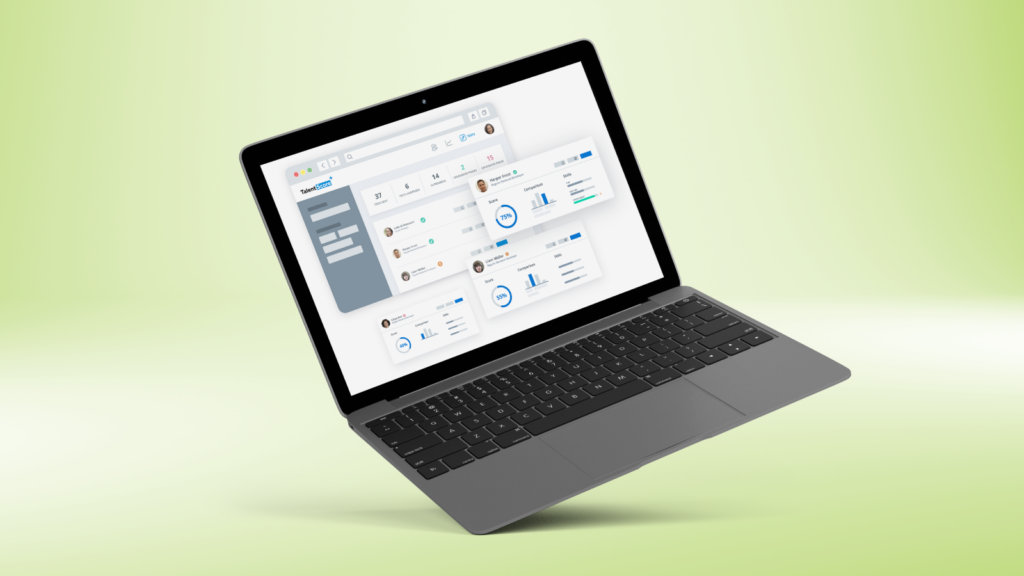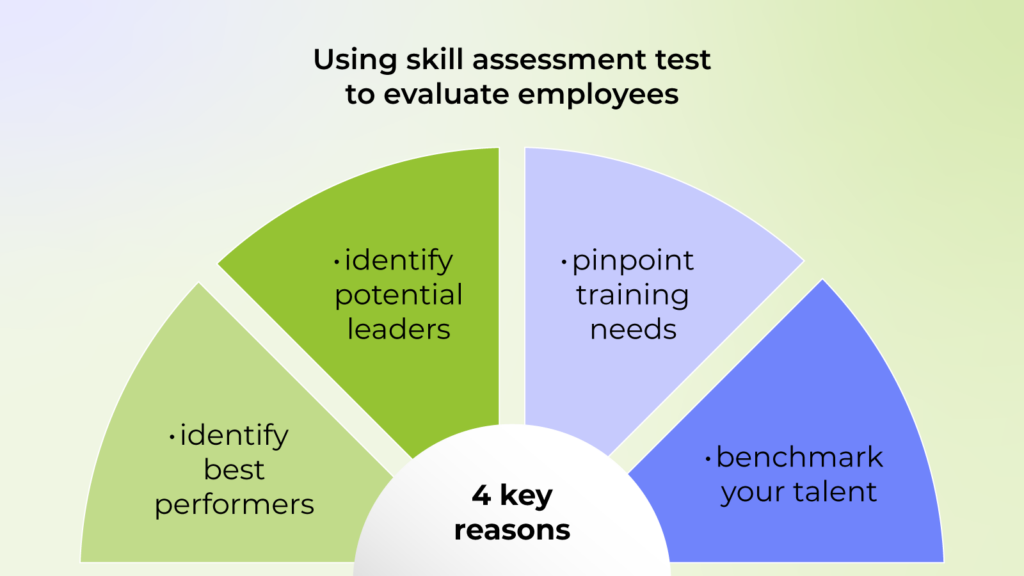
Una guía completa para dominar la evaluación de las competencias técnicas

The value of technical skill assessment has skyrocketed. Gone are the days when these abilities were confined to the realms of engineering or software development.
Now, roles ranging from data-driven decision-makers to digital marketing maestros demand a solid foundation in technical expertise.
Whether you’re in finance, healthcare, or the arts, technical skills have found their way into the core of professional competencies.
So, with this widespread integration, how does one gauge their proficiency and stand out from the crowd? This is where the significance of technical skills assessment comes into play.

Introduction: The importance of technical skills in the modern world
Have you taken a moment to observe the transformative shift in the employment landscape recently? It’s evident that there’s an increasing inclination towards roles that prioritize technical expertise.
This isn’t limited to just fields like software development or programming. Even areas such as data analysis, digital design, and emerging tech sectors are witnessing a surge in demand for individuals equipped with specialized technical knowledge.
As industries evolve and technology becomes an integral part of our daily operations, the emphasis on technical skills has never been higher.
Consequently, it’s not merely about possessing these skills anymore; it’s equally crucial to validate and demonstrate one’s adeptness and mastery in them to potential employers and peers.
What is a technical skill assessment?
Before diving deep, let’s break things down a bit.
Defining technical skills
At the very essence, what do we mean by a habilidad técnica? It’s essentially a specialized capability or knowledge geared towards executing particular tasks related to one’s job.
You can liken it to what many term as ‘hard skills.’ These are concrete proficiencies, quantifiable and distinct, that individuals acquire through training or experience.
For instance, writing code in Python or creating designs with Adobe Illustrator are prime examples of such skills. They are not abstract or intangible but are instead skills that one can showcase, measure, and evaluate based on proficiency.
The purpose of assessment
Evaluations, often viewed as structured tools of measurement, are incredibly instrumental for employers and educators alike. Their primary purpose? To meticulously measure and understand an individual’s level of expertise and capability in distinct skill areas.
These assessments aren’t merely about passing or failing; they provide a comprehensive overview of where an individual stands in terms of proficiency.
By subjecting oneself to these evaluations, individuals offer a transparent view of their skills, strengths, and areas needing improvement.

It’s akin to undergoing a rigorous benchmark test, a diagnostic tool if you will, that meticulously examines and highlights the nuances of one’s technical aptitude.
Through these evaluations, both the assessor and the assessed gain valuable insights, ensuring that the individual is well-matched to roles or educational paths that align with their demonstrated skills.
Types of technical skill assessments
There’s no one-size-fits-all when it comes to assessments. They can vary based on the skill being measured and the industry.
Practical exams
These evaluations are practical in nature, requiring direct engagement and application of skills.
For instance, you could be tasked with writing a concise piece of code, crafting a visually appealing webpage from scratch, or configuring and establishing a functional network.
Such hands-on assessments delve deep into your real-world capabilities, offering a tangible measure of your expertise in the task at hand.
Theoretical tests
These types of assessments zero in on the underlying theoretical knowledge that supports a specific skill.
Instead of testing your ability to simply perform a task, they challenge your understanding of the core principles and concepts that underpin it.
For instance, if we talk about object-oriented programming, it’s not just about writing a code snippet. It’s about demonstrating a deep comprehension of its foundational principles, such as inheritance, polymorphism, and encapsulation.
Through these evaluations, you’re given an opportunity to showcase not just what you can do, but also how well you truly understand the “why” and “how” behind it.
Project-based assessments
On certain occasions, a snapshot or a quick test might not suffice to truly assess an individual’s expertise.
Observing someone in a sustained, real-world setting, over an extended duration, can offer a more comprehensive perspective on their skillset.
Projects, especially those spanning weeks or even months, serve as an ideal platform for this. They not only test the technical know-how but also other facets like persistence, problem-solving, adaptability, and collaboration.
By diving deep into projects, individuals get to showcase a broader spectrum of their abilities, providing a rounded, holistic insight into their competence and dedication.

Preparing for a technical skill assessment
Awareness and knowledge form the foundation, but they are only a part of the journey towards mastery. Just as a soldier doesn’t march into battle based solely on knowledge, success in any endeavor requires thorough preparation.
It’s the bridge between understanding the theoretical aspects and executing them practically.
Whether it’s an exam, a job interview, or any task at hand, equipping yourself through diligent preparation ensures that you’re not just knowledgeable, but also ready to apply that knowledge effectively.
In essence, while knowledge gives you the tools, preparation ensures you know how to wield them adeptly.
Understanding the assessment criteria
Before diving into any task or assessment, it’s imperative to have clarity on the expectations. What are the assessors looking for? Is the focus on your hands-on, practical abilities, where you demonstrate tasks in real-time scenarios?
Or are they more interested in your foundational, theoretical understanding of concepts? Perhaps it’s a blend of both.
Having this understanding upfront allows you to tailor your preparation and approach, ensuring that you meet or even exceed the set benchmarks and criteria.
It’s all about aligning your strengths with the evaluation’s objectives.
Hands-on practice
Consistent practice is the key to mastery in any field. The principle is straightforward: the more time and effort you invest in honing a skill, the more proficient you become. It’s akin to sharpening a blade with repetitive strokes.
Engaging in real-world projects offers invaluable, on-the-ground experience, presenting challenges that textbooks might not cover.
Meanwhile, mock tests provide a structured environment to test your knowledge and gauge where you stand.
Simulations, on the other hand, recreate specific scenarios you might encounter, helping you develop the aptitude to tackle them with confidence.
Together, these diverse practice methods ensure a well-rounded development of your skills.
Seeking feedback and iterating
Embracing feedback is a cornerstone of growth and development. While self-reflection is essential, there’s immeasurable value in seeking perspectives from outside sources.
Whether it’s colleagues at your level, experienced mentors guiding your journey, or even diverse voices from online forums and communities, these external viewpoints can shed light on areas you might have overlooked.
They provide constructive criticism, commend strengths, and suggest areas of improvement. Remember, every piece of feedback is a stepping stone, an opportunity to refine your skills and broaden your understanding.
So, don’t shy away; actively seek out feedback and use it as a tool for continuous betterment.

Common mistakes and how to avoid them
Navigating technical assessments requires more than just knowledge; it demands a certain level of mindfulness and strategy. Dashing through tests, glossing over the instructions, or an inflated sense of confidence can often lead to unintended mistakes.
These are not just oversights but potential pitfalls that can skew the results and not truly reflect your capabilities. It’s imperative to approach each assessment with a calm demeanor and a well-thought-out plan.
By doing so, you ensure that you are not only showcasing your skills but also demonstrating your ability to approach challenges methodically and judiciously. Remember, the journey through an assessment is as significant as the knowledge you bring to it.
Benefits of effective technical skill assessment
While the immediate goal of assessments might be to secure that coveted position or role, their benefits extend far beyond that singular achievement.
Assessments act as mirrors, reflecting not just our strengths but also highlighting areas that need further refinement. By pinpointing these areas, they provide a roadmap for personal and professional growth.
Moreover, successfully navigating through these evaluations can significantly bolster one’s confidence, reaffirming that their skills and knowledge are on par with industry standards.

But perhaps the most profound impact of assessments is how they foster a culture of continuous learning. They instill a realization that in the ever-evolving world, there’s always something new to grasp, making lifelong learning not just a concept but a necessary pursuit.
The future of technical skill assessments: Trends and predictions
As technology continues to evolve, especially with groundbreaking advancements in fields like Artificial Intelligence (AI) and Virtual Reality (VR), the landscape of assessments is poised for a transformative shift.
These technologies promise to usher in an era of assessments that are not only more immersive but also tailored to individual needs.
Imagine being evaluated in a virtual environment that adapts in real-time based on your responses, or AI-driven platforms that provide instant feedback and resources for improvement.
Such advancements not only enhance the technical skills assessments experience but also make it more holistic and person-centric.
Truly, with these technological leaps, the potential for innovative and dynamic assessment methods is boundless. The horizon of possibilities is vast, and we are just at the dawn of this exciting new age.
Conclusión
Achieving proficiency in technical skills assessments goes beyond merely securing top marks in an evaluation. It’s a comprehensive display of your capabilities, a stage where you lay bare your expertise for all to see.
But it doesn’t stop at showcasing; it’s also an introspective journey where you identify your strengths to build upon and recognize weaknesses to address.
In a world where technology is in a constant state of flux, embracing these assessments is also about adapting and growing.
It’s about recognizing that the tech landscape will continue to shift and change, and to thrive in it, one must adopt a mindset of perpetual learning and relentless pursuit of improvement.
Descubra cómo puede ayudarle la herramienta de evaluación de competencias DevSkiller.
Programe una demostración con uno de nuestros expertos en productos o vea este rápido Vídeo de demostración de 5 minutos para saber más.
FAQ
- Why are technical skills important?
As the digital revolution continues, technical skills are crucial for a wide range of professions, ensuring efficiency and innovation. - How can I improve my technical skills?
Continuous learning, hands-on practice, and seeking mentorship are great ways. - Are technical skill assessments only for IT professionals?
No, they apply to various industries, from finance to design. - How often should I assess my technical skills?
Regularly. As technology evolves, staying updated is crucial. - Can I use online platforms for skill assessment?
Absolutely! Numerous platforms offer both learning and assessment tools.




